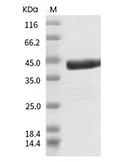Shopping Cart
- Remove All
 Your shopping cart is currently empty
Your shopping cart is currently empty

MERS-CoV Nucleocapsid Protein (His) is expressed in Baculovirus insect cells with His tag. The predicted molecular weight is 46.51 kDa and the accession number is K0BVN3.

| Pack Size | Price | Availability | Quantity |
|---|---|---|---|
| 100 μg | $583 | In Stock | |
| 200 μg | $994 | 7-10 days | |
| 500 μg | $2,010 | 7-10 days |
| Biological Activity | Activity testing is in progress. It is theoretically active, but we cannot guarantee it. If you require protein activity, we recommend choosing the eukaryotic expression version first. |
| Description | MERS-CoV Nucleocapsid Protein (His) is expressed in Baculovirus insect cells with His tag. The predicted molecular weight is 46.51 kDa and the accession number is K0BVN3. |
| Species | MERS-CoV |
| Expression System | Baculovirus Insect Cells |
| Tag | C-His |
| Accession Number | K0BVN3 |
| Synonyms | Nucleo,NP Protein, MERS-CoV,novel coronavirus Nucleoprotein Protein, MERS-CoV,ncov NP Protein, MERS-CoV,cov np Protein, MERS-CoV,coronavirus Nucleoprotein Protein, MERS-CoV,coronavirus Nucleocapsid Protein, MERS-CoV,coronavirus NP Protein, MERS-CoV |
| Construction | A DNA sequence encoding the MERS-CoV Nucleoprotein (AFS88943.1) (Met1-Asp413) was fused with a polyhistidine tag at the C-terminus. Predicted N terminal: Met 1 |
| Protein Purity | > 90 % as determined by SDS-PAGE  |
| Molecular Weight | 46.51 kDa (predicted) |
| Endotoxin | < 1.0 EU/μg of the protein as determined by the LAL method. |
| Formulation | Lyophilized from a solution filtered through a 0.22 μm filter, containing 20 mM Tris, 500 mM NaCl, 10% gly, pH 8.0.Typically, a mixture containing 5% to 8% trehalose, mannitol, and 0.01% Tween 80 is incorporated as a protective agent before lyophilization. |
| Reconstitution | A Certificate of Analysis (CoA) containing reconstitution instructions is included with the products. Please refer to the CoA for detailed information. |
| Stability & Storage | It is recommended to store recombinant proteins at -20°C to -80°C for future use. Lyophilized powders can be stably stored for over 12 months, while liquid products can be stored for 6-12 months at -80°C. For reconstituted protein solutions, the solution can be stored at -20°C to -80°C for at least 3 months. Please avoid multiple freeze-thaw cycles and store products in aliquots. |
| Shipping | In general, Lyophilized powders are shipping with blue ice. |
| Research Background | Coronaviruses are enveloped viruses with a positive-sense RNA genome and with a nucleocapsid of helical symmetry. Coronavirus nucleoproteins localize to the cytoplasm and the nucleolus, a subnuclear structure, in both virus-infected primary cells and in cells transfected with plasmids that express N protein. The coronavirus N protein is required for coronavirus RNA synthesis and has RNA chaperone activity that may be involved in template switch. Nucleocapsid protein is the most abundant protein of coronavirus. During virion assembly, N protein binds to viral RNA and leads to the formation of the helical nucleocapsid. Nucleocapsid protein is a highly immunogenic phosphoprotein also implicated in viral genome replication and in modulating cell signaling pathways. Because of the conservation of the N protein sequence and its strong immunogenicity, the N protein of coronavirus is chosen as a diagnostic tool. |

Copyright © 2015-2025 TargetMol Chemicals Inc. All Rights Reserved.